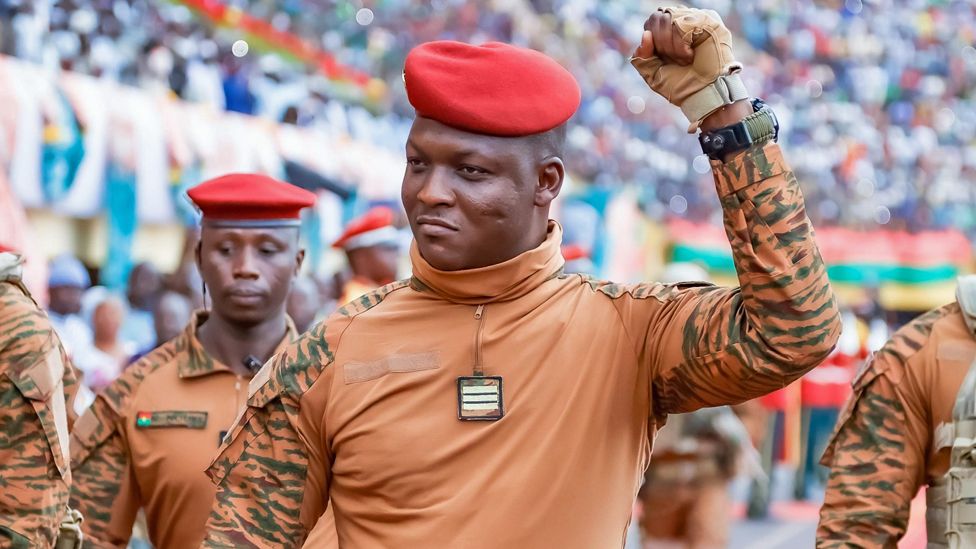Capt Ibrahim Traoré: The Charismatic Leader Captivating Hearts Across Africa
At the helm of Burkina Faso’s military government, Captain Ibrahim Traoré, a dynamic 37-year-old, has emerged as a pivotal figure not just in his country but in the broader context of African leadership. Presenting himself as a pan-Africanist, Traoré seeks to liberate Burkina Faso from what he perceives as the enduring structures of Western imperialism and neo-colonialism.
A New Era of Leadership
Since assuming control in a coup in 2022, Traoré has realigned Burkina Faso’s foreign policies away from France, which historically was seen as a former colonial power, towards building strong ties with Russia. His administration has introduced left-leaning economic strategies aimed at better leveraging the nation’s mineral wealth.
As part of this revolutionary shift, Traoré established a state-owned mining entity and mandated that foreign companies contribute significant stakes in their local ventures, as well as provide essential skills to Burkinabé nationals. This new policy impacted international companies, including Nordgold, a Russian miner which recently secured a license for continued operations in Burkina Faso.
Growing Popularity and Controversial Reforms
Traoré’s radical transformations have significantly boosted his support across the continent. Beverly Ochieng, a senior researcher at Control Risks, observed that many leaders and intellectuals in various African nations regard Traoré as a beacon of hope. “His messages resonate strongly with the current sentiments of many Africans, particularly in questioning the longstanding ties with the West and the persistent poverty in a resource-rich continent,” Ochieng said.
His rhetoric, skillfully amplified through social media channels, has generated a movement, celebrating his image akin to that of Thomas Sankara, another iconic Burkina Faso leader. Strategies employed by Traoré include engaging directly with citizens and an aggressive online campaign that has garnered him recognition within and outside Africa.
The Challenges of Governance
Despite his popularity, Traoré’s administration faces significant challenges, particularly in combating a decade-long Islamist insurgency that threatens national stability. Critics have pointed to how the junta has suppressed dissent, targeting opposition groups, media, and civil society organizations. Critics, including medical professionals and jurists, have been dispatched to the front lines in the fight against terrorism, raising human rights concerns.
Moreover, his anti-Western narrative has drawn ridicule from leaders like French President Emmanuel Macron, who denounced Traoré as part of a dangerous alliance with neo-imperialists, indicating that the military leader’s alliances could undermine the sovereignty he professes to champion.
Youthful Leadership and Future Prospects
At the core of Traoré’s appeal is his youth, resonating in a nation where the median age is just under 18. According to analyst Rinaldo Depagne, his strategic retaking of the revolutionary mantle of past influential leaders contributes to his growing support. “He has a rare charisma, projects confidence, and knows how to make a traumatized nation feel hopeful about the future,” Depagne commented.
Economic Progress Amidst Tensions
Reports from institutions such as the International Monetary Fund (IMF) and the World Bank suggest that Burkina Faso’s economy is demonstrating resilience, even amidst a challenging security environment. This augurs well for Traoré’s vision but also implies a balancing act of strengthening governance while addressing security issues.
| Aspect | Details |
|---|---|
| Leadership Style | Charismatic and youth-oriented, resembling Thomas Sankara. |
| Economic Policies | Goals of maximizing national benefits from natural resources. |
| International Relations | Shift from France to Russia; tense relations with Western nations. |
| Public Sentiment | Increasing popularity despite security challenges and anti-democratic measures. |
While the future remains uncertain for Traoré, his influence is undeniable as he navigates an evolving landscape in West Africa, encouraging other nations to reconsider their allegiance to Western powers.


